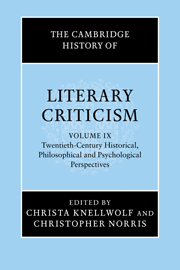Book contents
- Frontmatter
- Introduction
- HISTORY
- MARXISM AND POST-MARXISM
- FROM CULTURAL POETICS TO CULTURAL STUDIES
- PSYCHOANALYTIC APPROACHES
- GENDER AND SEXUALITY
- COLONIALISM, POST-COLONIALITY, NATION AND RACE
- 18 Post-colonial theory
- 19 African American literary history and criticism
- 20 Anthropological criticism
- MODERNITY AND POSTMODERNISM
- PHILOSOPHY, AESTHETICS AND LITERARY CRITICISM
- INTERDISCIPLINARY APPROACHES
- Bibliography
- Index
- References
18 - Post-colonial theory
from COLONIALISM, POST-COLONIALITY, NATION AND RACE
Published online by Cambridge University Press: 28 March 2008
- Frontmatter
- Introduction
- HISTORY
- MARXISM AND POST-MARXISM
- FROM CULTURAL POETICS TO CULTURAL STUDIES
- PSYCHOANALYTIC APPROACHES
- GENDER AND SEXUALITY
- COLONIALISM, POST-COLONIALITY, NATION AND RACE
- 18 Post-colonial theory
- 19 African American literary history and criticism
- 20 Anthropological criticism
- MODERNITY AND POSTMODERNISM
- PHILOSOPHY, AESTHETICS AND LITERARY CRITICISM
- INTERDISCIPLINARY APPROACHES
- Bibliography
- Index
- References
Summary
Post-colonial theory or post-colonialism can be said to have been inaugurated with the publication of Edward Said's Orientalism in 1978. This seminal work heralded a revolution in the field of literary studies. It shows how no form of intellectual or cultural activity is innocent of power hierarchies, highlighting the collusion between literary representation and colonial power. Orientalism demonstrates how every branch of knowledge, scientific as well as that broadly denoted ‘the humanities’, is not merely tinged with, but part and parcel of, the establishment of European political hegemony through the process of colonial conquest and domination. However, it is the stress on the literary text that has marked out and at the same time circumscribed, the field of post-colonial studies.
In the two decades since the publication of Orientalism, post-colonialism has developed into a sprawling academic discipline. Its purview has expanded and in its examination of the power/knowledge nexus, post-colonialism has ranged over a wide variety of subjects, including the history of colonial conquests, of anti-colonial struggles, the exigencies of post-colonial nation formations and the politics of cultural domination. In geographical terms, it covers the whole world, examining the cultural ramifications of political and economic domination. Historically, it had begun by looking at post-colonial periods, after the process of colonisation had started, that is from the eighteenth and nineteenth centuries, and thus was part of the deconstructive questioning of the European Enlightenment. More recently, post-colonial scholars have begun to delve further back in time and, in a healthy partnership with new historicism, are now examining the process of Renaissance self-fashioning, as it pertains to travel and the ‘discovery’ of ‘new lands’.
- Type
- Chapter
- Information
- The Cambridge History of Literary Criticism , pp. 235 - 248Publisher: Cambridge University PressPrint publication year: 2001
References
- 5
- Cited by

